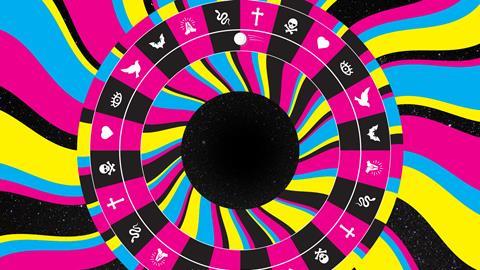A growing number of Christians are experimenting with psychedelic drugs to heal past trauma and find God. But it’s akin to spiritual Russian roulette, says Carrie Lloyd
When I hear conversations float around the topic of hallucinogens, I’m reminded of a few teenage memories: that one time I found an open-air swimming pool at 3am and observed a group of people sitting along the side, playing with the water as if it were elastic, shouting: “Look! It’s all springy!”
It turned out that these strangers were high on the illegal drug LSD, and it took only a few seconds for them to realise, unlike our Lord, they could not walk on water.
Another tale features a friend’s sister who, high on magic mushrooms, answered the door to a visitor, thinking they were ‘death’ and jumped out of the first-floor window, breaking her ankle and, I can only assume, her reputation.
Other stories are less dramatic, but some are full of tragedy – such as losing high school acquaintances too young – which is why I never experimented with drugs myself. Even when I was offered cocaine throughout my advertising career. Even when I was an atheist.
Since my return to Christianity, I’ve met many people attending support groups to help them overcome their addictions to drugs and alcohol. Seeing the Church minister to recovering addicts has reinforced my belief that the Holy Spirit really can bring inner healing.
What I could not have imagined, however, is that increasingly there is a rising body of people within the Church who are choosing to take hallucinogens in an attempt to heal past traumas.
Ayahuasca
The American entrepreneur Gerard Armond Powell has observed: “All disease, disorder and addictions stem from the yearning to reunite with one’s soul.” It seems in both America and the UK, attempts to reunite with one’s soul have veered off-piste from the traditional routes (prayer, counselling, nutritional advice, fasting) to a much more controversial approach; and that is the use of psychedelics.
Ibogaine, ayahuasca, DMT and psilocybin may be illegal in both countries, but they aren’t prohibited in other nations, such as Costa Rica and Mexico. In recent years, these drugs – ayahuasca in particular – have grown in popularity, helped by the media picking up and sharing stories of Westerners travelling to their countries of origin to experiment.
I have encountered many influential voices within the Church loosening their reins on their former religious rules on drugs, finding themselves on week-long, ibogaine/ayahuasca retreats administered often by shamans or healing coaches.
I’ve interviewed more than 50 people in the last year who have turned to psychedelics for a variety of reasons (a drop in the ocean for the numbers who are spending their hard-earned cash on these retreats).
And the findings of this experimental culture are as inconsistent as the different reactions people have to these drugs. Within the group were both believers and unbelievers; addicts and non-addicts; trauma victims and the worried well. Their curiosity and reasons for dabbling differed, depending on their individual stories.
To add to the research, I’ve also listened carefully to the clinical psychologists in two of the most elite and sophisticated colleges in England – Imperial College London being one of them.
At its Centre for Psychedelic Research, clinicians have used psilocybin (more commonly known as magic mushrooms) in an attempt to cure treatment-resistant depression. The results, according to the doctors, have been surprisingly effective – many people have been healed of depression and post traumatic stress disorder (PTSD).
The team had to go through a huge amount of red tape to allow for these tests in a clinical setting, due to the fact that the substance is illegal. These trials certainly didn’t use the spiritual guidance of a shaman (as is the case with ayahuasca rituals) and they ensured that clients were chaperoned throughout.
According to one professor involved in the trials, the only negative side-effects have been headaches, but those self-administering other psychedelics – such as ibogaine – outside of a clinical setting have had more negative results, including some cardiac arrests and even death.
The Church’s response to drugs
Until recently, the Church took a fairly strong stance, vetoing any use of drugs. And this still stands for the majority of Christians – there are many references in the Bible emphasising sobriety, caring for our bodies and each other (Proverbs 20:1; Ephesians 5:18; Galatians 5:21; 1 Peter 5:8; 1 Timothy 3:8).
Illegal drugs have often been considered a heavily demonic activity, leading down dangerous paths to opening up more spiritual warfare and sabotaging those who are vulnerable.
The main justifications for why some Christians have begun to change their minds and explore these ventures are fivefold:
The first argument proposes that plant teas – ayahuasca leaves are boiled to make a tea that you drink during a ceremony – are an organic part of nature originally created by God, and therefore were created as a beneficial healing tonic.
The second is that those suffering trauma haven’t experienced healing through the traditional methods, but by experimenting with mind-altering substances they’ve encountered God and gained a new perspective on themselves and their pain. (This argument suggests the ends justify the means.)
The third says it’s the motivation behind the drug, rather than the drug itself, that determines if it partners with witchcraft and the demonic. Therefore it’s possible – at least in theory – to engage with these substances in a safe way.
The fourth is that there is very little mentioned in the Bible about drug taking. Alcohol and being drunk has often been referenced. But snorting, injecting or smoking drugs? Not so much.
The fifth justification is that many people have already found God on ayahuasca and ibogaine. So surely, we, too, can meet him ‘there’?
What is ayahuasca?
Ayahuasca is a South American psychoactive brewed drink traditionally used both socially and as a ceremonial spiritual medicine among the indigenous people of the Amazon basin. The tea causes altered states of consciousness, including visual hallucinations and altered perceptions of reality.
Ayahuasca is commonly made from the banisteriopsis caapi vine, the p shrub or another similar substitute, mixed together with other ingredients.
Internationally, the Convention on Psychotropic Substances says the active ingredient – DMT – has high potential for abuse.
In recent years ayahuasca ceremonies have increased in popularity with Westerners seeking healing or a new high, spurred on by endorsements from a growing list of celebrities.
The rituals are presided over by a shaman (a witch-doctor) and involve a ‘purging’ (vomiting) once the tea has been drunk, followed by dramatic visual hallucinations.
'I experienced God’s love on ayahuasca'
I wasn’t raised as spiritual, but I was always spiritually curious. Something in me yearned to know why we are here, what’s the meaning of all this and why do we do what we do.
At the time of learning about the drug ayahuasca, I was at a crossroads in my career. Some might call it burnout. Keeping up with the rat race in London was becoming less appealing, and I needed time out. Not just to rest, but also to reflect on what was creating this sense of disconnection between myself and others.
So I travelled to Peru. That’s where I met other westerners who started asking if I was on an ayahuasca road trip – it was an assumed desire for us folk from Europe.
People began to talk of the healing properties of their experiences, and a seed was planted. On returning to the UK, I met friends who would share openly about their previous trips to South America, and say things like “if there is one thing you must do before you die, it’s take ayahuasca”.
I researched thoroughly psychedelics and both the benefits and the risks. Many places were now using international tourism as a trap to abuse the vulnerability of people wanting to seek answers and healing on ayahusaca.
Retreats were being built for the business, not the healing aspects. So I was aware there were many places seeking to exploit me. With a friend, we decided to make this trip back to Peru, to a reputed retreat that worked closely with the locals, supporting the community.
Before departure, we took our preparation seriously. We cut back on certain foods in our diet, wrote down our intentions and the questions we wanted answered – for me I wanted clarity on this disconnection I found within myself.
The actual experience of taking the ayahuasca tea is hard to put into words, and I’ve been wary of sharing this experience in case I sound crazy, or that it doesn’t sound real – that I would expose a sacred experience to judgement.
But I did unlock a huge amount of insight from my time there. The initial experience was discovering this all-encompassing feeling that I was utterly loved. That there was a connection, to the universe, to the unity in each other.
An incredibly emotional experience that found me in tears. This discovery of the enormity of love made me feel as if God was inside of me, not distant, not this terrifying entity in the sky. God was close, and the masculine and feminine entity was prevalent throughout.
I was aware I had leaned into masculine energy in life to protect myself, rather than be open and humble to the femininity of who I was.
During the ceremony we all experienced what they call ‘ego-death’. This allowed us to find clarity. We had to remove our own pride and judgements. Afterwards, I felt more connected to people, and had this overwhelming sense of connection to God.
Although this was a catalyst for insight, it never should be seen as a cure. I hope to delve deeper into this deeper sense of the love of God as I walk further through along my life’s journey.
Sarah, from London
*Sarah is an alias
Welcoming the demonic?
Removing my fear and judgement around the subject, I chose to listen with as much compassion as I could fathom to my fellow Christians who have experimented with these substances.
As a daughter of a former addict, and as one who had the potential to be one myself, I had to ensure my research into this cultural trend really looked into the why and the wherefores of people who had experienced legitimate intimacy with God, and wasn’t tinged with my own bias or personal experiences of loss and death with drugs.
For the majority of those who shared their stories, what came across was that they truly loved Jesus and sought highly for a closeness to God. Many were mature and experienced Christians who had tried psychedelics as part of their quest for healing, and were now inviting fellow believers to take this journey.
They think these substances can play a part in healing people’s PTSD, and dislodge the problems that have not yet been healed by prayer, meditation or traditional psychotherapies. Those who seemed most in pain were desperate to try anything, at any cost, including spending time, money and energy away on retreats to countries where many of these drugs are legal.
The majority of those I interviewed did have a certain degree of anxiety, didn’t hold much stillness or peace in presence, and had been circling the spaces of religious and spiritual movements in the hope of healing – this was yet another attempt to find more holistic freedom.
There was an element of extremism that came into play with all those I spoke to: their personalities were such that they took great risks in life, accompanied sometimes by a careless attitude towards themselves and others.
It seemed that the loss of ego was important for the great many of those experimenting with these drugs. They felt humbled and found ‘clarity’ while high. Having out-of-body experiences, or having the humility to actually begin to ask questions, meant they discovered that the ego began to take a back seat, as if the person surrendering to the drug finally put themselves aside.
This perhaps explained why they were finding healing in trauma, why they could hear more clearly from God and why they were finally getting answers to certain questions that had been pestering them for a lifetime. One man confessed to the fact that if anyone did come into the retreat with a sense of ego or paranoia, they would likely have a disturbing experience, one that could cause more trauma than that with which they arrived.
But there were as many ‘bad trip’ stories as there were ‘good experiences’ within this research. The bad trips did echo the demonic on the worst levels I’ve seen in my pastoral career at Bethel Church in California.
One person shared how, after all the vomiting (a very common response to the initial intake of the tea), some people were screaming and writhing around like snakes, some hissing, some howling for hours. Another person, on the opposite side of the same room, quietly asked Jesus why he wasn’t intervening to stop the demonic activity happening in front of them; Jesus looked to the one writhing around and replied: “She doesn’t want my help.”
There’s a paradox to these reports – people are experiencing the demonic in the same room as those receiving revelation from Jesus. To me it exemplifies how beautiful our Lord is – that he is willing to meet us and speak to us anywhere, even in settings where dark spiritual forces are at work.
The love of the Most High
In hearing every justification for the Christian to partake in ayahuasca and the like, I would now like to try to answer from my own humble opinion and research, what I believe to be true according to the gospel; not just for the drug-taker but for those around them.
In my personal experience of pastoring a body of people – those who are truly healed, who are truly close to God. They have an extraordinary capacity to love others and an exuberant amount of mercy and grace for all people, in all walks of life – humility drips off them like an athlete in training. Those in pain, or hurt, disregard others. Those who are healed seek to heal.
They give versus take, they ask versus project, they consider another, rather than expect the room to answer to them. They are warm, full of curiosity and discipline, full of the fruit of the Spirit (Galatians 5:22-23), not because they must, but because they can’t help it.
These postures weren’t naturally formed, they personally worked hard at character. They didn’t necessarily have an easy or adversity-free life; if anything, quite the contrary. Character for them was built on the day-to-day decisions: facing difficult choices with strength from the Lord. For them, a trigger was an invite, not a reason to hide away.
There was no quick fix. There was no pill or tea. It was to take on the longevity of long-suffering love. The very refusal to invite escapism, the very humbling experience of embracing hurt and disappointment, was itself the tonic. It brought wisdom and a strength hewn from faith in God, leading to greater faith in themselves. Easier said than done.
But what about the justifications for Christians taking these substances? Although these hallucinogens have been formed from ingredients in the ground, it doesn’t necessarily equate to being good for us.
Tobacco is a plant (and we know how harmful that can be!), my oleander is dangerous for puppies to ingest, and if you know anything about Greek philosophy, you know it was hemlock that killed Socrates. Just because something was created from God’s hands doesn’t mean everything earth-born was designed to heal his children.
The second justification of ‘we’ve tried everything’ can explain the desperate need to experiment or indeed go beyond our own self-discipline. Desperate times often call for desperate measures.
However, with the unpredictability of these experiences, be it crawling on your belly like Sir Hiss from Disney’s Robin Hood, or saying goodbye to life with a cardiac arrest, the risks are too catastrophic for me to believe we are seeking the best interest for our bodies, even if the soul is dying for connection.
The motivation behind taking the drug, whether it’s to be closer to God or to free ourselves of ourselves in order to hear from the Holy Spirit more clearly, does not guarantee an encounter with the Most High. “These are not trips you can control – which is the whole point,” says one regular trip-taker. I like his honesty, and his ownership of choosing to risk the encounter, every time.
To believe we can enter a situation with the right posture, at the hands of something so capricious, would expose us to a level of vulnerability that would be a playground for the enemy to attack. A game of Russian roulette, if you will.
One of the justifications I mentioned earlier was Bible-based –surely if there is nothing in the Bible that specifically mentions illegal drugs, it is up to us to discern whether or not they are a bad thing for our individual contexts and consciences? It is true, you will not find the word ‘drugs’ in English translations of the Bible. However, the New Testament was originally written in Greek.
The Greek word pharmakia from which we get our words ‘pharmacy’ and ‘pharmaceutical’ is found in Galatians 5:20 where it is translated into English as ‘sorcery’ (eg NKJV) but has an underlying meaning of ‘drugs’. The word forms part of a list of other “acts of the flesh” (Galatians 5:19) which result from living a life apart from the Spirit of God. The Greek word is also found in Revelation 9:21 where it is listed with murders and immorality.
The same for Revelation 18:23 where it is linked to cruel Babylon and to deception. Essentially, we can’t get out of this on a technicality. Pharmakia, or anything mind-altering, be it drink or drugs, might be a nice sedative or escape for those who don’t believe in the mind-altering highs our Lord can give us in his presence. Christians were given a strength far greater – one that endures and builds us.
For me, the quick fix undermines the trust we could have in God to give us the strength and fortitude to own and face that which we need to perhaps work on ourselves.
Going low
The brain is full of elasticity, forever changeable – so there is hope for those searching for healing. But we don’t need a drug to do that. If we embrace adversity, if we open ourselves up to humility and teachability, then with God’s help we may find our mind being renewed in ways we never imagined possible. Are we willing to stoop low enough from our ego to encounter God once more, sober?
My final conclusion brought me back to that of loving others. When interviewing the friends of those who had experimented with these drugs I discovered something interesting.
There were many ibogaine and ayahuasca users who told me their experiences had provided a successful outcome and a shortcut to the more longwinded and sometimes painful talking-therapy options that most others explore when they have past or present trauma to deal with.
But their friends confessed their behaviour after taking the drugs was exactly the same. There hadn’t been an increase in love or affection for others.
There hadn’t been a wider periphery vision for the needs and sufferings of other people. If anything, it was no more effective than a Christian attending the occasional conference, but forgetting to pray behind closed doors.
I would have to incline my conclusion towards that of Harvard Medical School professor and member of the White House Commission on Opioids, Dr Bertha Madras, who once confessed: “People think there is going to be a magic pill…What they should not be desperate for is a quick fix.”
Perhaps, then, it is not the question of whether these things work, nor even whether it is biblically sound to experiment with sandcastle treatments.
It is the question of whether people have begun to truly heal – the litmus test being: does this person now think of others more? Are they caring for another beyond themselves?
For if there was anything that truly brought healing to my life, it was the surrendering of my own ego for the common good: in fostering children, in the sacrifice of the quick fix, in the everyday grind of choosing goodness – the harder path. It didn’t always feel good, it didn’t guarantee a high, but in every encounter that brought me back to the fragility of humanity, such humility found me stooping low enough to get on my knees, enough to find him kneeling with me, uniting me back once more to my soul.
In essence, freedom isn’t about getting high, it is about getting low.
Read more on this story






































No comments yet